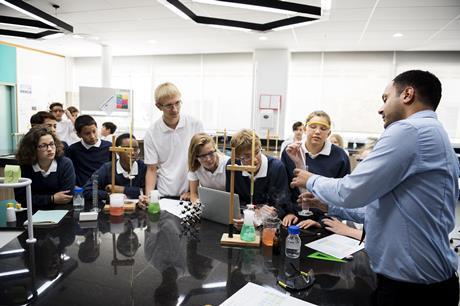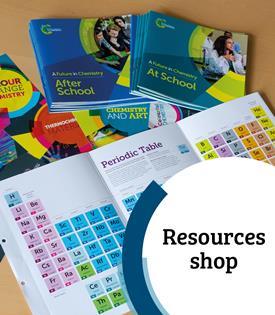- Home
- I am a …
- Resources
- Collections
- Remote teaching support
- Starters for ten
- Screen experiments
- Assessment for learning
- Microscale chemistry
- Faces of chemistry
- Classic chemistry experiments
- Nuffield practical collection
- Anecdotes for chemistry teachers
- Literacy in science teaching
- More …
- Climate change and sustainability
- Alchemy
- On this day in chemistry
- Global experiments
- PhET interactive simulations
- Chemistry vignettes
- Context and problem based learning
- Journal of the month
- Chemistry and art
- Classic chemistry demonstrations
- In search of solutions
- In search of more solutions
- Creative problem-solving in chemistry
- Solar spark
- Chemistry for non-specialists
- Health and safety in higher education
- Analytical chemistry introductions
- Exhibition chemistry
- Introductory maths for higher education
- Commercial skills for chemists
- Kitchen chemistry
- Journals how to guides
- Chemistry in health
- Chemistry in sport
- Chemistry in your cupboard
- Chocolate chemistry
- Adnoddau addysgu cemeg Cymraeg
- The chemistry of fireworks
- Festive chemistry
- Collections
- Education in Chemistry
- Teach Chemistry
- Events
- Teacher PD
- Enrichment
- Our work
- More navigation items
Chemistry for science teachers
Boost your confidence in delivering practical work, and develop the skills you need to teach key chemistry topics
This course is designed for teachers looking to build their knowledge and confidence in chemistry. The course is comprised of three optional modules, covering teaching strategies for different topic areas.
At a glance
- Upcoming dates:
Various, Sept – Dec 2024, 3.45 – 5.30pm - Cost: Free for Teach Chemistry members
- Session frequency: Weekly or monthly
Choose a module to get started

Module 1
Upcoming dates
Not currently available – get notified when new dates are added
Topics covered
- Supporting good practical chemistry
- Reactivity of metals
- Electrolysis
- Quantitative chemistry

Module 2
Upcoming dates
Wednesdays, Sept – Dec 2024
3.45 – 5.30pm
Topics covered
- Identifying unknowns
- Equilibrium
- Energy changes
- Rates of reaction

Module 3
Upcoming dates
Thursdays, Sept – Dec 2024
3.45 – 5.30pm
Topics covered
- Structure and bonding
- Hydrocarbons
- Acids and bases
- Further quantitative chemistry

Module 1
Module 1 covers the following topics:
- Supporting good practical chemistry
- Reactivity of metals
- Electrolysis
- Quantitative chemistry
You’ll build your subject knowledge across these topics, explore common misconceptions and develop ideas for practical activities.
Upcoming dates and registration
Module 1 is not due to run in the autumn term
However, you can still:
- Sign up to hear about new dates when they become available
- Check out and register for module 2 or module 3

Module 2
Module 2 covers the following topics:
- Identifying unknowns
- Equilibrium
- Energy changes
- Rates of reaction
You’ll build your subject knowledge across these topics, explore common misconceptions and develop ideas for practical activities.
Upcoming dates and registration
Module 2 – autumn term
Wednesdays, September – December 2024, 3.45 – 5.30pm, online
You’ll need to be a member of Teach Chemistry to register for this course. Sign in now or register for an account today to get started.
Session 1: Wednesday 11 September 3.45 – 5.30pm
Identifying unknowns
- Chromatography
- Using chemical tests to identify ions
- RSC resources including gridlocks
- Student misconceptions
- Ideas for practical work
- Solubility and precipitation
Session 2: Wednesday 9 October 3.45 – 5.30pm
Rates of reaction
- Rates of reactions
- Data handling and interpretation
- Misconceptions
- RSC resources
Session 3: Wednesday 13 November 3.45 – 5.30pm
Equilibrium
- How to teach equilibrium
- Student misconceptions
- Ideas for practical work
- RSC resources
Session 4: Wednesday 11 December 3.45 – 5.30pm
Demonstrations and energy change
- Creating exciting demonstrations
- Energy changes
- RSC resources

Module 3
Module 3 covers the following topics:
- Structure and bonding
- Hydrocarbons
- Acids and bases
- Further quantitative chemistry
You’ll build your subject knowledge across these topics, explore common misconceptions and develop ideas for practical activities.
Upcoming dates and registration
Module 3 – autumn term
Thursdays, September – December 2024, 3.45 – 5.30pm, online
You’ll need to be a member of Teach Chemistry to register for this course. Sign in now or register for an account today to get started.
Session 1: Thursday 12 September 3.45 – 5.30pm
Structure and bonding
- A range of different types of bonding and structures
- Strategies and teaching models including electrostatics and the ‘octet rule’
- Common misconceptions and challenges
- Practical activities to develop understanding
Session 2: Thursday 10 October 3.45 – 5.30pm
Hydrocarbons
- Properties, processes and reactions related to hydrocarbons
- Resources to help provide global perspectives in the curriculum
- Everyday contexts for teaching hydrocarbons
- Practical activities to develop understanding
Session 3: Thursday 14 November 3.45 – 5.30pm
Acids and bases
- The spiral curriculum and different teaching models
- Global perspectives in the curriculum
- Common misconceptions and challenges
- Visually stimulating experiments and demonstrations
Session 4: Thursday 12 December 3.45 – 5.30pm
Further quantitative chemistry
- Pedagogical approaches to multi-step mole calculations
- Practical approaches to teaching and understanding titrations
- Common misconceptions and challenges
Additional information
This course is most suited to teachers who may be:
- relatively new in post
- teaching chemistry outside their own subject specialism
- keen to increase their own understanding and confidence to teach chemistry within a 11–16 secondary science programme
Each module comprises a series of four sessions, held weekly or monthly, depending on the term. By completing all four, you will qualify for a certificate of attendance to add to your professional development portfolio/record.
In advance of the module, we will give you information on 1–2 practicals, which we will ask you to carry out prior to the relevant session, ready to discuss with your facilitator and fellow participants.
Support from your subject or school leadership team is a critical factor in successful professional development. When you sign up for a module, we’ll ask you to provide details of a senior member of staff who is responsible for your professional development provisions, eg head of chemistry/department, assistant headteacher, headteacher etc.

FAQs
Who is this course for?
This course is suitable for teachers in all career stages. The course expects a basic level of subject knowledge and are ideally suited if you are new to teaching chemistry; you have recently focused on another subject and would like to boost your knowledge; or you are returning from a teaching break.
The course is not suitable for trainee/student teachers in the first two terms of their training year.
Do I have to complete all modules?
You do not have to complete one module to attend another. Each module covers teaching strategies for different topic areas. Please choose the module that includes the topics most relevant for you.
How much does the course cost?
Nothing at all! The course is free to join, although places are limited.
Is this course recognised? Will I receive a certificate?
Absolutely. The course is recognised CPD, so you will receive a certificate of attendance for your professional development portfolio/record once you have completed all of your chosen course’s sessions.
To qualify for the certificate of attendance, you must attend all sessions and complete all required tasks.
Do you record the sessions?
No, course modules are not recorded. If you are not available for the course dates currently advertised, watch this space – most courses are run regularly.











